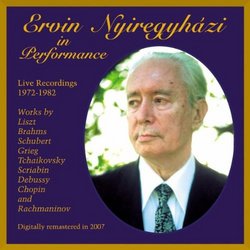| All Artists: Ervin Nyiregyházi Title: Ervin Nyiregyhazi in Performance, Live Recordings Members Wishing: 0 Total Copies: 0 Label: Music & Arts Original Release Date: 1/1/2007 Re-Release Date: 12/11/2007 Genres: Dance & Electronic, New Age, Classical Styles: Instrumental, Opera & Classical Vocal, Ballets & Dances, Waltzes, Chamber Music, Forms & Genres, Concertos, Short Forms, Sonatas, Suites, Historical Periods, Classical (c.1770-1830), Modern, 20th, & 21st Century, Romantic (c.1820-1910), Instruments, Keyboard Number of Discs: 2 SwapaCD Credits: 2 UPC: 017685120220 |
Search - Ervin Nyiregyházi :: Ervin Nyiregyhazi in Performance, Live Recordings
 | Ervin Nyiregyházi Ervin Nyiregyhazi in Performance, Live Recordings Genres: Dance & Electronic, New Age, Classical
|
Larger Image |
CD Details |
CD ReviewsLike Nothing You've Ever Heard... Hank Drake | Cleveland, OH United States | 01/10/2008 (4 out of 5 stars) "By now, the story of Ervin Nyiregyhazi has become so legendary, it scarcely needs repeating: a child-prodigy on the level of Mozart and Saint-Saens, a spectacular Carnegie Hall debut in 1920, a career flameout soon thereafter, ten marriages, and decades of poverty before a short lived rediscovery in the 1970s. Nyiregyhazi's reemergence resulted in several recordings which were published in the 1970s and early 1980s. The recordings contained here include a few items from those albums and some privately recorded items which have circulated among collectors. Listening to Nyiregyhazi compels attention on several levels. First of all, he could play incredibly loud. Even at full volume, however, the tone is remarkably non-harsh. Nyiregyhazi freely doubles bass notes, so the melody is always floating on a cradle of rumbling lower notes. His tempi are slow (even by today's standards), and his playing is rhythmically free even when compared to 19th Century pianists such as Hoffman, Rachmaninoff and Paderewski. With Nyiregyhazi's approach, the printed text is merely a point of departure. His deviations from the score are so extreme even Vladimir Horowitz might have blushed. A case in point is Nyireghazi's "arrangement" of the second movement from Rachmaninoff's Second Piano Concerto: whole sections are discarded, the composer's harmonic progressions are altered, and the final result bears little resemblance to Rachmaninoff's original. Technically, several factors are bothersome: there are fistfuls of wrong notes, at times the piano is simply being banged, the sustaining pedal is almost constantly held down. While fascinating to hear, it can be rather like watching a train wreck in progress: One just has to get out of the way. Probably the best playing here is Liszt's Au Lac de Wallenstadt: coherent phrasing and control over the lower levels of dynamics, all delivered with a melting legato. The other Liszt works (including the Légendes: No. 1 & 2 recorded at his "comeback" recital), also contain some fine playing. Scriabin's Fourth Sonata begins promisingly, but soon lapses into a mélange of wrong notes and technical desperation. As for Chopin, those raised on Arthur Rubinstein's interpretations will be in for a shock: Nyiregyhazi's tempos are not the norm for Mazurkas, and the Nocturne in F minor is almost glacial in its slowness. The 1936 recording offers a tantalizing glimpse of Nyiregyhazi before age and alcohol had impaired his playing. Perhaps as a result of playing a quiet piece with orchestral accompaniment, little of the Nyiregyhazi sound comes through, but there is greater rhythmic and technical control than in the later recordings. Most of these recordings were made by non-professionals while Nyiregyhazi played in the homes of enthusiasts or in small halls, so the sound quality varies. Judging by his other recordings I've heard, the dynamic range has been compressed somewhat, so Nyiregyhazi's fortissimos are not as astonishing as usual. Kevin Bazzana's liner notes make an unconvincing case for inducting Nyiregyhazi into pantheon of great pianists." An Eccentric Genius Robert E. Nylund | Ft. Wayne, Indiana United States | 11/05/2009 (4 out of 5 stars) "Ervin Nyiregyhazi was hailed by famed music Harold Schoenberg as a last glimpse of great Romantic piano playing. He emerged from virtual obscurity in the early 1970s and played a series of recitals, usually in churches or homes. He also made a series of recordings for Desmar and Columbia recordings. He played with great intensity and concentration. Yes, there were wrong notes and great liberties at times, but the overall effect of his playing was often overwhelming. Those of us who were fortunate to see and hear him in person will never forget the amazing presence in his performances.
I heard him on April 30, 1978, at the home of Ronald F. Antonioli, in Novato, California. One of the most amazing feats was his playing of his own transcription of Lizst's "Faust Symphony," a very lengthy and incredible musical depiction of the famed Goethe drama. All of the elements of this amazing piece were present in his performance. He breathed hard and sweated tfor more than an hour, holding the invited audience's attention. He played a few shorter pieces after that. We all had dinner and then, after having some wine, he played requests and amazed all of us. Nyriregyhazi's playing gives us an idea of what romantic piano playing was like. The pianists in the nineteenth century, including Liszt himself, often exercised great freedom, virtuosity, and intensity in their performances. Here is a rare link with a past. The pianists we have had heard in recent years seldom come to close to this style of playing; the emphasis today is on playing the notes as correctly as possible and there are few pianists who play with the kind of feeling demonstrated in these recordings." |

 Track Listings (10) - Disc #1
Track Listings (10) - Disc #1